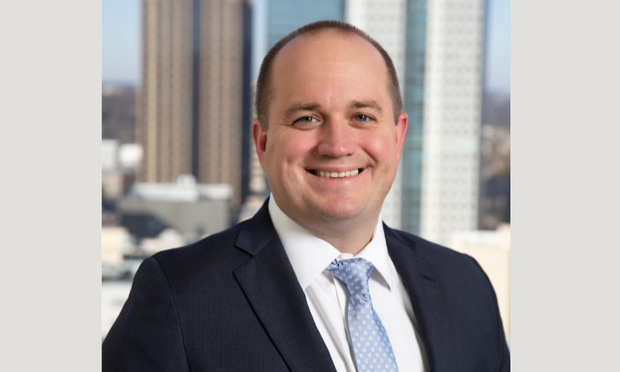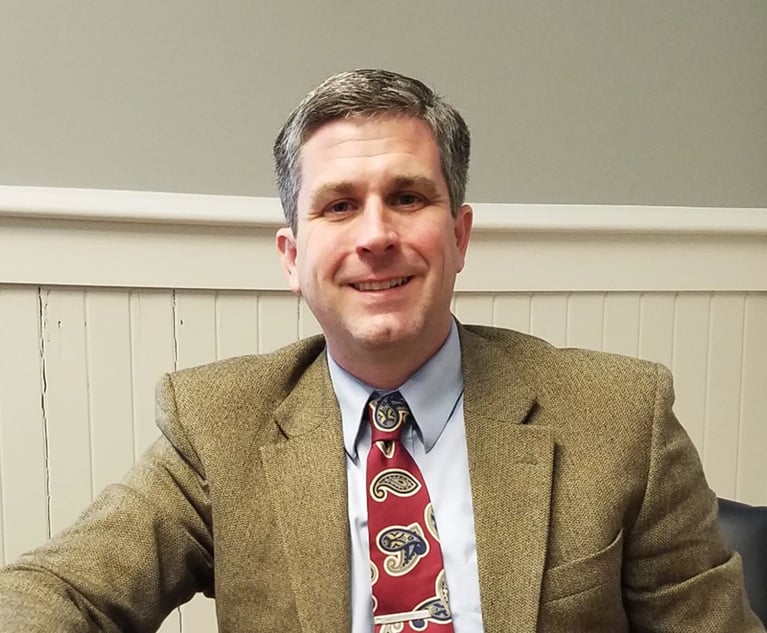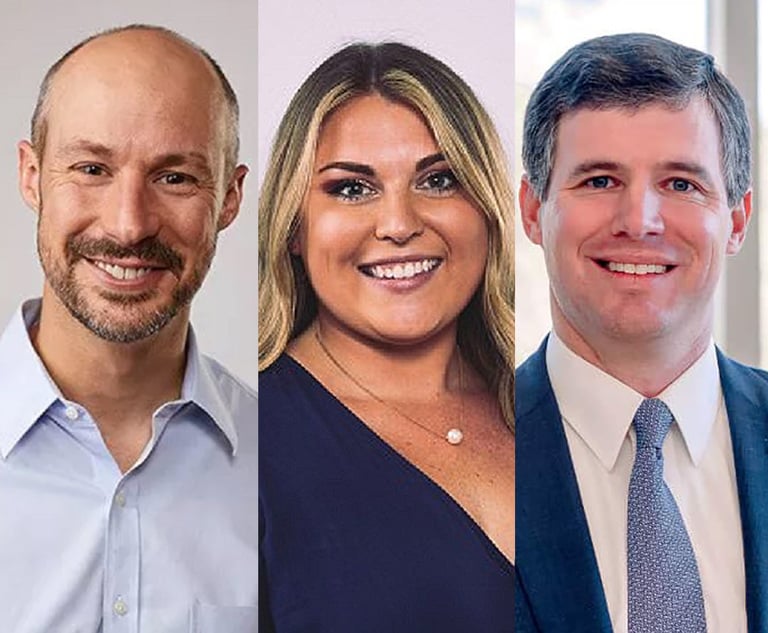Amid COVID-19, Georgia Lawyers and Insurers Should Expect 'More Chaos'
There is significant ambiguity as to which insurers will cover COVID-19 claims; the specific treatments that will be covered; and whether out-of-network treatment will be fully covered.
May 06, 2020 at 01:22 PM
5 minute read
 Alan Holcomb of Turnbull, Cain & Holcomb. (Courtesy photo)
Alan Holcomb of Turnbull, Cain & Holcomb. (Courtesy photo)
The novel coronavirus, SARS-CoV-2, or COVID-19, has caused hundreds of thousands of hospitalizations, claimed thousands of lives and brought the world economy to its knees. The strength of medical and economic contingency plans has been thoroughly tested in places like New York City, Washington state, New Orleans and the state of Georgia.
Since the World Health Organization declared a global pandemic, governments have executed measures to slow the spread of the virus: mandatory quarantines, closure of schools and universities and implementation of social distancing policies. As a result of these measures, the global economy has come to a halt, leaving millions unemployed and causing financial strain across all sectors of the U.S. economy. Georgia has not been left "unmarked" by the virus: more than 25,000 Georgians have been diagnosed with COVID-19, and there have been more than 1,000 COVID-19-related deaths.
As with all business sectors, Georgia's legal community has been greatly affected by the virus and resulting lockdown: the number of personal injury filings has decreased; several law firms have cut employee compensation; and the court system has effectively been suspended since mid-March.
The most serious consequence of the pandemic on the Georgia legal community has been the indefinite suspension of jury trials. Understandably, court and health officials are concerned about forcing potential jurors into a courthouse in close quarters to one another. There is a real fear that convening juries will negate whatever success Georgia has had in slowing the rate of infection. While this delay certainly affects the efficient resolution of civil cases, the indefinite delay of criminal trials is of concern. Under the Sixth Amendment to the Constitution, criminal defendants have a right to a speedy trial. The longer criminal trials and grand juries are suspended, the greater the likelihood that we will see Georgia criminal defendants file civil rights actions alleging a violation of their Sixth Amendment rights. This will put more pressure on a court system already overburdened. Some legal analysts have proposed "Zoom" trials to alleviate this problem; such trials, however, raise serious concerns over potential violations of the Confrontation Clause of the Sixth Amendment.
Gov. Brian Kemp recently announced plans to reopen Georgia's economy, permitting certain businesses, stores and restaurants to reconvene operations in early May. As a result, legal analysts around the state predict a surge in both court filings and insurance claims over the coming weeks in several industries—especially in the travel, hospitality, health care and insurance sectors.
For example, thousands of Georgians have been treated for COVID-19. This treatment will lead to the submission of substantial health insurance claims. While certain politicians and private health insurers have promised that COVID-19 treatments will be covered at no additional cost to the insured, there currently is no statutory enforcement mechanism to hold private insurers accountable, should they fail to follow through on these promises.
Consequently, there is significant ambiguity as to which insurers will cover these claims; the specific treatments that will be covered; and whether out-of-network treatment will be fully covered. Given the sheer volume of benefit claims that will be made, this confusion will inevitably lead to hundreds, if not thousands, of lawsuits related to improperly denied benefits. Ambiguity only creates more risk for health insurance companies, and it would serve them well to follow through on the promises previously made.
In addition, there likely will be an increase in federal False Claims Act (whistleblower), kickback and bribery cases filed in Georgia. In March, the federal government passed the Coronavirus Aid, Relief, and Economic Security Act, or CARES Act, to flood the economy with $2 trillion of liquidity as quickly as possible. As with any large-scale government action undertaken in a crisis, there will be businesses that fraudulently siphon public money for their own gain (e.g., claims related to the 2008 Troubled Asset Relief Program). The health care industry will be under a microscope in this area, as other commentators have already raised concerns about these organizations wrongly obtaining grants through the CARES Act for improper purposes.
As society begins to reopen, only time will tell whether the emergency measures taken by the federal government and state of Georgia effectively reduced the spread of the virus. In the near term, however, we can expect only more chaos—especially in the legal profession.
Alan Holcomb is a trial lawyer who handles catastrophic injury cases. He is a partner at Turnbull, Cain & Holcomb, a partner of The Law Center, a national network of law firms which advocate for those who have suffered from personal injury, asbestos-related diseases, motor vehicle accidents and more.
This content has been archived. It is available through our partners, LexisNexis® and Bloomberg Law.
To view this content, please continue to their sites.
Not a Lexis Subscriber?
Subscribe Now
Not a Bloomberg Law Subscriber?
Subscribe Now
NOT FOR REPRINT
© 2025 ALM Global, LLC, All Rights Reserved. Request academic re-use from www.copyright.com. All other uses, submit a request to [email protected]. For more information visit Asset & Logo Licensing.
You Might Like
View All

DC Lawsuits Seek to Prevent Mass Firings and Public Naming of FBI Agents
3 minute read

Apply Now: Superior Court Judge Sought for Mountain Judicial Circuit Bench
3 minute readTrending Stories
- 1States Accuse Trump of Thwarting Court's Funding Restoration Order
- 2Microsoft Becomes Latest Tech Company to Face Claims of Stealing Marketing Commissions From Influencers
- 3Coral Gables Attorney Busted for Stalking Lawyer
- 4Trump's DOJ Delays Releasing Jan. 6 FBI Agents List Under Consent Order
- 5Securities Report Says That 2024 Settlements Passed a Total of $5.2B
Who Got The Work
J. Brugh Lower of Gibbons has entered an appearance for industrial equipment supplier Devco Corporation in a pending trademark infringement lawsuit. The suit, accusing the defendant of selling knock-off Graco products, was filed Dec. 18 in New Jersey District Court by Rivkin Radler on behalf of Graco Inc. and Graco Minnesota. The case, assigned to U.S. District Judge Zahid N. Quraishi, is 3:24-cv-11294, Graco Inc. et al v. Devco Corporation.
Who Got The Work
Rebecca Maller-Stein and Kent A. Yalowitz of Arnold & Porter Kaye Scholer have entered their appearances for Hanaco Venture Capital and its executives, Lior Prosor and David Frankel, in a pending securities lawsuit. The action, filed on Dec. 24 in New York Southern District Court by Zell, Aron & Co. on behalf of Goldeneye Advisors, accuses the defendants of negligently and fraudulently managing the plaintiff's $1 million investment. The case, assigned to U.S. District Judge Vernon S. Broderick, is 1:24-cv-09918, Goldeneye Advisors, LLC v. Hanaco Venture Capital, Ltd. et al.
Who Got The Work
Attorneys from A&O Shearman has stepped in as defense counsel for Toronto-Dominion Bank and other defendants in a pending securities class action. The suit, filed Dec. 11 in New York Southern District Court by Bleichmar Fonti & Auld, accuses the defendants of concealing the bank's 'pervasive' deficiencies in regards to its compliance with the Bank Secrecy Act and the quality of its anti-money laundering controls. The case, assigned to U.S. District Judge Arun Subramanian, is 1:24-cv-09445, Gonzalez v. The Toronto-Dominion Bank et al.
Who Got The Work
Crown Castle International, a Pennsylvania company providing shared communications infrastructure, has turned to Luke D. Wolf of Gordon Rees Scully Mansukhani to fend off a pending breach-of-contract lawsuit. The court action, filed Nov. 25 in Michigan Eastern District Court by Hooper Hathaway PC on behalf of The Town Residences LLC, accuses Crown Castle of failing to transfer approximately $30,000 in utility payments from T-Mobile in breach of a roof-top lease and assignment agreement. The case, assigned to U.S. District Judge Susan K. Declercq, is 2:24-cv-13131, The Town Residences LLC v. T-Mobile US, Inc. et al.
Who Got The Work
Wilfred P. Coronato and Daniel M. Schwartz of McCarter & English have stepped in as defense counsel to Electrolux Home Products Inc. in a pending product liability lawsuit. The court action, filed Nov. 26 in New York Eastern District Court by Poulos Lopiccolo PC and Nagel Rice LLP on behalf of David Stern, alleges that the defendant's refrigerators’ drawers and shelving repeatedly break and fall apart within months after purchase. The case, assigned to U.S. District Judge Joan M. Azrack, is 2:24-cv-08204, Stern v. Electrolux Home Products, Inc.
Featured Firms
Law Offices of Gary Martin Hays & Associates, P.C.
(470) 294-1674
Law Offices of Mark E. Salomone
(857) 444-6468
Smith & Hassler
(713) 739-1250






